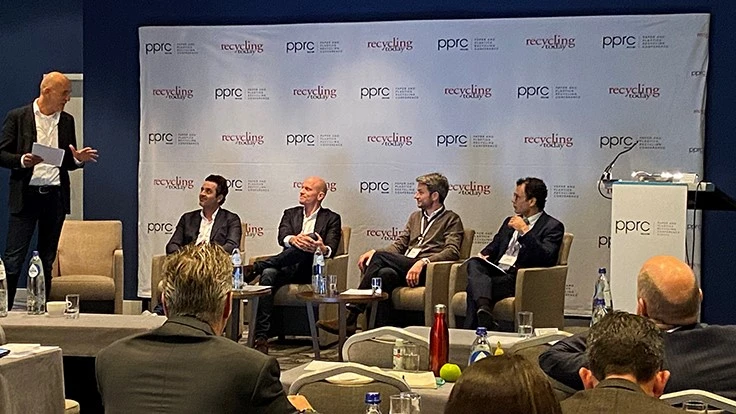
Wider economic worries might be part of the plastic recycling landscape in Europe, but panelists at the 2022 Paper & Plastic Recycling Conference Europe, held in mid-November in Rotterdam, see overall prospects for their services as staying in high demand.
Bram Snijders of the Netherlands-based Infinity Recycling helps lead an investment fund designed to scale up chemical or “advanced” recycling capacity in Europe and globally. Snijders said Infinity has made three such investments thus far, and added, “We target 10 to 12, so there is more to come.” Snijders said Infinity is “in dialog” with about 100 such companies to find the remaining investment targets.
Kras Recycling, also based in the Netherlands, has concentrated on expanding mechanical plastic recycling capacity in Europe, according to Ben Kras, the family firm’s CEO. The company currently recycles about 160,000 tons per year of plastic, with facilities in the Netherlands and Kosovo.
“We’re about to double capacity” in Kosovo, said Kras. The company followed one of its Dutch plastic scrap-generating customers to Kosovo, and has found the Eastern European nation brings opportunities, with Kras Recycling increasingly bringing in material “from other Balkan countries,” said Kras.
Max Craipeau is demonstrating the globalization potential of plastics recycling. He is a French citizen who leads Singapore-based Greencore Resources Ltd., which operates a sizable plastics recycling facility (with five extrusion lines) in Indonesia.
Craipeau said the increasing value of scrap polyethylene terephthalate (PET) beverage bottles, combined with efforts by his company and others, has helped raise the PET bottle recycling rate in Indonesia to about 26 percent. In Singapore, he said the scheduled introduction of a deposit-return system (DRS) for PET bottles could quickly raise that island nation’s PET bottle recycling rate to 80 percent.
DRS systems were one of three best practices cited by Jacob Rognhaug of Norway-based Tomra Systems ASA as a way to boost the world’s plastic recycling rate. The vice president with the technology and equipment firm cited separate collection efforts and mixed waste sorting of remaining materials as the other two best practices.
Rognhaug said DRS alone can lead to PET bottle recycling rates as high as 98 percent in Germany and 92 percent in Lithuania. In terms of mixed plastic collection practices, he pointed to a district in Norway that has put a combination of separate collection and automated sorting best practices to work. Rognhaug said the district, sorting a mixed “dry” municipal solid waste stream, is able to recover from 70 to 90 percent of plastics of all types that is 95 percent pure. “This has been a real eye-opener for the industry,” he commented.
Kras said he would nonetheless welcome more separate collection of plastics such as polypropylene (PP) and polystyrene (PS). “In the end, this will bring the best results. Otherwise, we are talking about downgrading, or downcycling,” he commented.
Rognhaug and Craipeau said they welcome the chemical recycling sector’s ability to divert difficult-to-recycle materials, but both also expressed some skepticism. Chemical recycling was introduced as a “silver bullet,” said Rognhaug, “but that is turning out not to be the case; they also need very high quality” feedstock, he remarked.
Craipeau said, ”If they absorb low-quality material, it is a good solution. If we are fighting for the same feedstock, considering the carbon footprint of many chemical recycling plants, it cannot work.”
The 2022 Paper & Plastics Recycling Conference Europe event was Nov. 15-16 at the Hilton Rotterdam in the Netherlands.
Get curated news on YOUR industry.
Enter your email to receive our newsletters.
Latest from Recycling Today
- Unifi launches Repreve with Ciclo technology
- Fenix Parts acquires Assured Auto Parts
- PTR appoints new VP of independent hauler sales
- Updated: Grede to close Alabama foundry
- Leadpoint VP of recycling retires
- Study looks at potential impact of chemical recycling on global plastic pollution
- Foreign Pollution Fee Act addresses unfair trade practices of nonmarket economies
- GFL opens new MRF in Edmonton, Alberta






